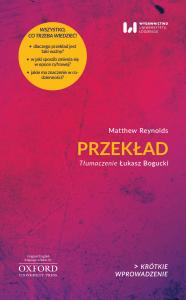-
2385
-
1675
-
1480
-
1267
-
1122
Przekład
Pliki do pobrania
Autor prezentuje najważniejsze zagadnienia związane z przekładem, posługując się przykładami z różnych języków. Argumentuje, dlaczego przekład jest tak ważny i ukazuje, jak zmienia się on w epoce cyfrowej. Zabiera Czytelnika w podróż – od starożytnych języków po światową angielszczyznę, od św. Hieronima po tłumacza Google. Dowodzi, że przekład znacząco wpływa na nasze życie – zapewnia dostęp do zagranicznych wiadomości, dubbingowanych filmów i instrukcji korzystania z kuchenki mikrofalowej, ale również oddziałuje na światowe religie, literaturę, kulturę i języki.
Translation: A Very Short Introduction was originally published in English in 2016. This translation is published by arrangement with Oxford University Press. Wydawnictwo Uniwersytetu Łódzkiego is responsible for this translation from the original work and Oxford University Press shall have no liability for any errors, omissions or inaccuracies or ambiguities in such translation or for any losses caused by reliance thereon.
Matthew Reynolds profesor języka angielskiego i krytyki porównawczej na Uniwersytecie Oksfordzkim oraz członek St Anne’s College. Jest autorem książki The Poetry of Translation: From Chaucer & Petrarch to Homer & Logue (2011). Jego prace nad tłumaczeniami obejmują też antologię Dante in English (2005), której był współautorem z Erikiem Griffithsem, rozdział Principles and Norms of Translation w czwartym tomie Oxford History of Literary Translation in English (2006) oraz serię esejów w „London Review of Books”. Przewodniczy corocznej nagrodzie tłumaczeniowej Oxford-Weidenfeld Translation Prize.
Łukasz Bogucki anglista, językoznawca i przekładoznawca. Jego zainteresowania naukowe dotyczą przede wszystkim teorii przekładu audiowizualnego, ale także translatoryki jako dyscypliny naukowej, przekładu ustnego i specjalistycznego, tłumaczenia wspomaganego komputerowo oraz lokalizacji. Autor kilkudziesięciu opracowań naukowych z zakresu przekładoznawstwa. Od wielu lat popularyzuje przekładoznawstwo i podejmuje starania o nadanie mu statusu oficjalnej dyscypliny naukowej. Jest cenionym dydaktykiem przekładu oraz promotorem ponad dwustu prac dyplomowych, w tym sześciu doktoratów.
Nabokov pisze o tym w przedmowie do swojego przekładu Eugeniusza Oniegina A. Puszkina, wyd. ang. Alexandr Pushkin, Eugene Onegin: A Novel in Verse, t. 1–2, wyd. popr., Princeton University Press, Princeton 1975.
Praktyka kanbun-kundoku opisana jest w rozdziale autorstwa Judy Wakabayashi, The Reconceptualization of Translation from Chinese in 18th-Century Japan, [w:] Eva Hung (red.), Translation and Cultural Change: Studies in History, Norms, and Image Projection, John Benjamins, Amsterdam 2005, s. 121–145; patrz też James Hadley, Theorizing in Unfamiliar Contexts: New Directions in Translation Studies, rozprawa doktorska, University of East Anglia, Norwich 2013 (praca nieopublikowana).
Łucja Biel, Jakość przekładu prawnego i prawniczego w świetle normy europejskiej PN-EN 15038 oraz hipotezy uniwersaliów translatorycznych, „Rocznik Przekładoznawczy” 2011, nr 6, s. 13–28, https://doi.org/10.12775/RP.2011.002
Ezra Pound, The Beautiful Toilet, 1–2, cytat za: Ezra Pound, Collected Shorter Poems, Faber and Faber, London 1968.
Bernard Lewis, From Babel to Dragomans: Interpreting the Middle East, Weidenfeld and Nicolson, London 2004, s. 29.
Martha P.Y. Cheung (red.), An Anthology of Chinese Discourse on Translation, t. 1, From the Earliest Times to the Buddhist Project, St Jerome, Manchester 2006, s. 7–12.
Ovid’s Epistles, tłum. zbiorowe, Jacob Tonson, London 1680.
Martha P.Y. Cheung (red.), An Anthology of Chinese Discourse on Translation, t. 1, From the Earliest Times to the Buddhist Project, St Jerome, Manchester 2006, s. 7–12.
Maria Tymoczko, Enlarging Translation, Empowering Translators, St Jerome, Manchester 2007, s. 71.
Ronit Ricci, On the Untranslatability of ‘Translation’: Considerations from Java, Indonesia, [w:] Ronit Ricci, Jan an der Putten (red.), Translation in Asia: Theories, Practices, Historiesm, St Jerome, Manchester 2011, s. 58.
Matthew Reynolds, Literatura w historii (i historii przekładów), tłum. Zofia Ziemann, „Przekładaniec” 2018, nr 36, s. 7–24, https://doi.org/10.4467/16891864PC.18.001.9543
O użyciu czasownika „przekładać” (to translate): Matthew Reynolds, The Poetry of Translation: From Chaucer & Petrarch to Homer & Logue, OUP, Oxford 2011, s. 1–8.
John Dryden, The Poems, Paul Hammond, David Hopkins (red.), t. 1–5, Longman, London 1995–2005, i, 384–385, oraz iv, 446; John Dryden, The Works, Edward N. Hooker, Hugh T. Swedenberg, Jr, i inni (red.), t. 1–20, University of California Press, Berkeley–London 1956–2000, v, 329–330. Patrz: Matthew Reynolds, The Poetry of Translation…, s. 73–74.
Jacques Derrida, Wieże Babel, tłum. Adam Dziadek, [w:] Piotr Bukowski, Magdalena Heydel (red.), Współczesne teorie przekładu. Antologia, Znak, Kraków 2009, s. 375–383.
Myriam Salama-Carr, Interpreters in Conflict – The View from Within: An Interview with Louise Askew, „Translation Studies” 2011, t. 4.1, s. 103–108: 106.
William Barnes, Poems of Rural Life in the Dorset Dialect: With a Dissertation and Glossary, John Russell Smith, London 1844, s. 11–12; John Dryden, Poems…, v, 80.
George Steiner, Po wieży Babel. Problemy języka i przekładu, tłum. Olga i Wojciech Kubińscy, TAiWPN Universitas, Kraków 2000.
Christine Brooke-Rose, Between (1968), [w:] The Brooke-Rose Omnibus, Carcanet Manchester 1986, s. 417–418.
John C.Catford, A Linguistic Theory of Translation, OUP, Oxford 1965, s. 39 i 49.
Tendencja do nominalizacji w języku francuskim opisana jest w: Jean-Paul Vinay, Jean Darbelnet, Stylistique comparée du Français et de l’Anglais, Didier, Paris 1973, s. 103.
Instrukcja tańca Morris: Jigs – An Aide Memoire, dostępny online http://www.themorrisring.org/sides/jigs-some-thoughts (dostęp: 01.03.2023).
Tony Harrison, Theatre Works 1973–1985, Penguin, Harmondsworth 1986, s. 190.
Ajschylos, Oresteja, tłum. Jan Kasprowicz, https://wolnelektury.pl/katalog/lektura/ajschylos-oresteja/ (dostęp: 14.03.2023).
Robert Browning, Poetical Works, t. 13, Smith, Elder & Co, London 1889, s. 269.
ISO Central Secretariat, The International Language of ISO Graphical Symbols, Geneva 2013, s. 15, 18 i 22.
Gordon Brotherston, Image of the New World: The American Continent Portrayed in Native Texts, Thames and Hudson, London 1979, s. 51–52.
Zdanie w języku chińskim zaczerpnięte z: Mona Baker, In Other Words: A Coursebook on Translation, Routledge, Abingdon 2011, s. 154.
Dante Alighieri, Hell, tłum. Dorothy L. Sayers, Penguin, Harmondsworth 1949, s. 1.
Dante Alighieri, The Divine Comedy, tłum. Henry Wadsworth Longfellow, t. 1, George Routledge and Sons, London 1867, s. 1.
Dante Alighieri, Boska komedia, tłum. Jan Korsak, https://wolnelektury.pl/katalog/lektura/boska-komedia-wstep.html (dostęp: 14.03.2023).
Friedrich Schleiermacher, Ueber die verschiedenen Methoden des Uebersezens, [w:] Hans Joachim Störig (red.), Das Problem des Übersetzens, Wissenschaftliche Buchgesellschaft, Darmstadt 1963, s. 47.
Dychotomię forenizacji i udomowienia objaśnił Lawrence Venuti w: The Translator’s Invisibility: A History of Translation, Routledge, wyd. 1, Abingdon 1995; wyd. 2, Abingdon 2008.
Finnish Immigration Service Refugee Advice Centre, Interpretation in the Asylum Process: Guide for Interpreters, Helsinki 2010, s. 9, http://www.migri.fi/download/16471_Tulkkaus_turvapaikkamenettelyssa_Opas_tulkeille_en.pdf?fd6e5908f746d288 (data dostępu 01.03.2023).
Andrew Bank, Bushmen in a Victorian World: The Remarkable Story of the Bleek–Lloyd Collection of Bushman Folklore, Double Storey, Cape Town 2006, s. 87.
Wilhelm H. I. Bleek, Lucy C. Lloyd, Specimens of Bushman Folklore, wstępem opatrzył George McCall Theal, George Allen and Company, London 1911, s. 84–85.
Recenzja Danna Gunna ukazała się w: „The Times Literary Supplement” 2008, 4 stycznia, nr 5466, s. 23; wersje Bassani i Weavera można znaleźć w odpowiedzi McKendricka, „The Times Literary Supplement” 2008, 15 lutego, nr 5472, s. 6.
Consolidated Version of the Treaty on European Union, https://eur-lex.europa.eu/legal-content/en/TXT/?uri=CELEX:12012M/TXT (także inne wersje językowe) (dostęp: 01.03.2023).
Polibiusz, Dzieje, tłum. Seweryn Hammer, Ossolineum, Wrocław 1957. Patrz też: Michael Cronin, Translation in the Digital Age, Routledge, Abingdon 2013, s. 15.
Humpty Dumpty jest postacią z Alicji w Krainie Czarów Lewisa Carrolla; z wielu polskich przekładów warto wymienić ten Roberta Stillera z roku 1986 (Lewis Caroll, Alicja w Krainie Czarów, tłum. Robert Stiller, Alfa, Warszawa 1986).
Rezolucja ONZ nr 242 omówiona jest w: Bernard Lewis, From Babel to Dragomans: Interpreting the Middle East, Weidenfeld and Nicolson, London 2004, s. 30.
Tekst traktatu Waitangi dostępny online: Treaty Of Waitangi, http://www.nzhistory.net.nz/politics/treaty-of-waitangi (dostęp: 01.03.2023). Kontekst historyczny omawiają Sabine Fenton i Paul Moon w: The Translation of the Treaty of Waitangi: A Case of Disempowerment, [w:] Maria Tymoczko, Edwin Gentzler (red.), Translation and Power, University of Massachusetts Press, Amherst 2002, s. 25–44: Lord Normanby jest cytowany na s. 30, zaś Kaitaia Chief Napera Panakareao na s. 40.
Haslina Haroun, Early Discourse on Translation in Malay: The Views of Abdullah bin Abdul Kadir Munsyi, [w:] Ronit Ricci, Jan van der Putten (red.), Translation in Asia: Theories, Practices, Histories, St Jerome, Manchester 2011, s. 73–87: 76.
Eugene Nida, Toward a Science of Translating: With Special Reference to Principles and Procedures Involved in Bible Translating, E. J. Brill, Leiden 1964, s. 160.
William A Smalley, Translation as Mission: Bible Translation in the Modern Missionary Movement, Mercer, Macon, GA 1991, s. 3, 41 i 174.
Jost Oliver Zetzsche, The Bible in China: The History of the Union Version or The Culmination of Protestant Missionary Bible Translation in China, Sankt Augustin, Nettetal, GE 1999, s. 77–82.
A. C. Partridge, English Biblical Translation, Deutsch, London 1973, s. 22, 41 i 95.
O roli Lutra: Daniel Weissbort, Astradur Eysteinsson (red.), Translation—Theory and Practice: A Historical Reader, OUP, Oxford 2006, s. 57–62.
Przekład św. Tomasza: Joseph A. Fitzmyer, Romans, A New Translation with Introduction and Commentary, Doubleday, New York 1993, s. 360–361.
Travis Zadeh, The Vernacular Qur’an: Translation and the Rise of Persian Exegesis, OUP, London 2012, s. 1–19. Tekst równoległy: Al-Qur’ān: A Contemporary Translation, tłum. Ahmed Ali, Princeton University Press, Princeton 2001.
Kate Sturge, Censorship of Translated Fiction in Nazi Germany, „TTR: traductions, terminologie, rédaction” 2002, t. 15.2, s. 153–169.
Marta Rioja Barrocal, English-Spanish Translations and Censorship in Spain 1962–1969, „inTRAlinea” 2010, t. 12, http://www.intralinea.org/archive/article/1658 (dostęp: 01.03.2023).
Camino Gutiérrez Lanza, Spanish Film Translation and Cultural Patronage: The Filtering and Manipulation of Imported Material during Franco’s Dictatorship, [w:] Maria Tymoczko, Edwin Gentzler (red.), Translation and Power, University of Massachusetts Press, Amherst 2002, s. 141–159: 147.
Guido Bonsaver, Fascist Censorship on Literature and the Case of Elio Vittorini, „Modern Italy” 2003, t. 8.2, s. 165–186: 175.
Matthew Reynolds, Semi-Censorship in Browning and Dryden, [w:] Francesca Billiani (red.), Modes of Censorship and Translation: National Contexts and Diverse Media, St Jerome, Manchester 2007, s. 187–204.
Matthew Reynolds, Likenesses: Translation, Illustration, Interpretation, Legenda, Oxford 2013, s. 89.
Irish Translators’ and Interpreters’ Association Cumann Aistritheoirí Agus Teangairí na Héireann, Code of Practice and Professional Ethics: http://translatorsassociation.ie/component/option,com_docman/ task,cat_view/gid,21/Itemid,61/ (data dostępu 01.03.2023). Patrz też: Julie McDonough Dolmaya, Moral Ambiguity: Some Shortcomings of Professional Codes of Ethics for Translators, „The Journal of Specialised Translation” 2011, t. 15, http://www.jostrans.org/issue15/art_mcdonough.php (data dostępu 01.03.2023).
Primo Levi, Se questo è un uomo, Einaudi, Milan 1958, s. 21. Patrz też: Michael Cronin Translation and Identity, Routledge, Abingdon 2006, s. 77.
Gayatri Chakravorty Spivak, Outside in the Teaching Machine, Routledge, Abingdon 1993, s. 183.
Meena T. Pillai, Gendering Translation, Translating Gender, [w:] N. Kamala (red.), Translating Women: Indian Interventions, Zubaan, New Delhi 2009, s. 1–15, 13.
Rada hrabstwa Gloucestershire, zalecenia dla tłumaczy w: Interpretation and Translation: Policy and Guidance for Staff, http://www.gloucestershire.gov.uk/extra/CHttpHandler.ashx?id=49179&p=0 (data dostępu 01.03.2023).
Owen Bowcott, Trials collapsing thanks to „shambolic” privatisation of translation services, „The Guardian” 2013, 6 lutego, http://www.theguardian.com/law/2013/feb/06/court-interpreting-services-privatisation-shambolic (dostęp: 01.03.2023).
Rabia Rehmen, Translator, [w:] Kate Clanchy (red.), The Path: An Anthology by the First Story Group at Oxford Spires Academy, First Story Limited, London 2015, s. 20.
Annalisa Sandrelli, Gli interpreti presso il tribunale penale di Roma: Un’indagine empirica, „inTRAlinea” 2011, t. 13, http://www.intralinea.org/archive/article/1670 (dostęp: 01.03.2023).
William J. Spurlin, Queering Translation, [w:] Sandra Bermann, Catherine Porter (red.), A Companion to Translation Studies, Wiley-Blackwell, Chichester 2014, s. 298–309: 300, 307.
Antoine Berman, l’Épreuve de l’étranger: culture et traduction dans l’Allemagne romantique: Herder, Goethe, Schlegel, Novalis, Humboldt, Schleiermacher, Hölderlin, Gallimard, Paris 1984.
Index Translationum online: http://portal.unesco.org/culture/en/ev.php-URL_ID=7810&URL_DO=DO_TOPIC&URL_SECTION=201.html (dostęp: 1.03.2023).
Tłumaczenia w Parlamencie Europejskim: http://www.europarl.europa.eu/aboutparliament/en/20150201PVL00013/Multilingualism (dostęp: 1.03.2023).
Dane na temat długości debat parlamentarnych za: Anna Codrea-Rado, European parliament has 24 official languages, but MEPs prefer English, „The Guardian” 2014, 21 maja, http://www.theguardian.com/education/datablog/2014/may/21/european-parliament-english-language-official-debates-data (dostęp: 1.03.2023).
Deborah Cao, Xingmin Zhao, Translation at the United Nations as Specialized Translation, „Journal of Specialised Translation” 2008, t. 9, s. 39–54: 48–51.
Esperança Bielsa, Susan Bassnett, Translation in Global News, Routledge, Abingdon 2009, s. 57, 108–110, 63.
Karen Stetting, Transediting: A New Term for Coping with the Grey Area between Editing and Translating, [w:] Graham Caie, Kirsten Haastrup, Arnt Lykke Jakobsen i inni (red.), Proceedings from the Fourth Nordic Conference for English Studies, University of Copenhagen, Copenhagen 1989, s. 371–382.
Przykład tłumaczenia maszynowego z języka rosyjskiego za: F. Knowles, Error Analysis of Systran Output – a suggested criterion for the internal evaluation of translation quality and a possible corrective for system design, [w:] Barbara M. Snell (red.), Translating and the Computer, North-Holland, Amsterdam–Oxford 1979, s. 109–133, 130; cytowane w: David Crystal, The Cambridge Encyclopedia of Language, CUP, Cambridge 1997, s. 352.
http://www.tripadvisor.co.uk/Hotel_Review-g297409-d455433-Reviews-Jinjiang_Sunshine_Hotel-Lanzhou_Gansu.html (dostęp: 1.03.2023).
Global Voices: http://globalvoicesonline.org/about/ (dostęp: 1.03.2023).
Mosireen: http://mosireen.org/ (dostęp: 01.03.2023).
Words of Women from the Egyptian Revolution online: https://www. facebook.com/HerstoryEgypt (dostęp: 01.03.2023); patrz także strona www Mony Baker: http://www.monabaker.org/?p=1567 (dostęp: 1.03.2023).
Ifor ap Glyn, glaw, wersy 1–2, tłum. David Miranda-Barreiro, Philip R. Davies, Transferre: https://valentinagosetti.wordpress.com/2015/06/23/welsh-poetry-into-galician-ifor-ap-glyn-translated-by-david-miranda-barreiro-and-philip-r-davies/ (dostęp: 1.03.2023).
Benedict Anderson, Imagined Communities: Reflections on the Origin and Spread of Nationalism, Verso, London 1983.
Johann Wilhelm Gottfried Herder, Briefe zu Beförderung der Humanität, [w:] Bernhard Suphan i inni (red.), Sämmtliche Werke, t. 18, Weidmann, Berlin 1883, s. 134–140.
Thomas Carlyle, On Heroes, Hero-Worship and the Heroic in History, Chapman and Hall, London 1897, s. 114. Patrz: Matthew Reynolds, The Realms of Verse, 1830–1870: English Poetry in a Time of Nation-Building, OUP, Oxford 2001, s. 17.
Lydia H. Liu, Translingual Practice: Literature, National Culture and Translated Modernity: China, 1900–1937, Stanford University Press, Stanford, CA 1995, s. 214–217.
Macaulay cytowany w: Chris Baldick, The Social Mission of English Criticism, 1848–1932, Clarendon Press, Oxford 1987, s. 70.
Ramanujan cytowany w: Naita Gokhale, Negotiating Multilingual Literary Spaces, http://www.india-seminar.com/2009/600/600_namita_gokhale.htm (dostęp: 1.03.2023).
Alexander Pope, The Rape of the Lock, 2. 45–46. Przełożył jako Il Riccio Rapito, Viola Papetti (Alexander Pope, Il Riccio Rapito, tłum. Viola Papetti, Rizzoli, Milan 1984, s. 64).
Alexander Pope, Porwany lok. Poemat heroikomiczny, tłum. Juliusz Kydryński, Wydawnictwo Literackie, Kraków 1982.
John Dryden, The Aeneis of Vergil, 11. 794–5; Virgil, Aeneid, 11. 794–5.
Walter Benjamin, Illuminationen. Ausgewählte Schriften, t. 1, Suhrkamp, Frankfurt am Main 1977, s. 50–59.
Ezra Pound, Song of the Bowmen of Shu, 1–4, za: Ezra Pound, Collected Shorter Poems, Faber and Faber, London 1968.
W. G. Sebald, Austerlitz, tłum. Anthea Bell, Penguin, London 2001, s. 1.
Martin Orkin, „I am the tusk of an elephant” – Macbeth, Titus and Caesar in Johannesburg, [w:] Ton Hoenselaars (red.), Shakespeare and the Language of Translation, Arden, London 2004, s. 270–288.
Przykład z Czechowa za: Brian Logan, Whose Play is it Anyway?, „The Guardian” 2003, 12 marca, http://www.theguardian.com/stage/2003/mar/12/theatre.artsfeatures (dostęp: 1.03.2023).
Andrea Peghinelli, Theatre Translation as Collaboration: A Case in Point in British Contemporary Drama, „Journal for Communication and Culture” 2012, t. 2.1, s. 20–30, 26.
Rosyjskie recenzje przedstawienia Miarka za miarkę z roku 2015: http://www.cheekbyjowl.com/measure_for_measure.php (dostęp: 01.03.2023).
Laurence Wright, Confronting the African Nightmare: Yael Farber’s „SeZaR”, „Shakespeare in Southern Africa” 2001, t. 13, s. 102–104.
Ron Jenkins, The Rhythms of Resurrection, [w:] Joseph Farrell, Antonio Scude (red.), Dario Fo: Stage, Text, and Tradition, Southern Illinois University Press, Carbondale, IL 2000, s. 29–38: 34.
Arnold Kettle cytowany w: Sinéad Mooney, A Tongue not Mine: Beckett and Translation, OUP, Oxford 2011, s. 178.
O obcojęzycznych wystawieniach sztuk Szekspira: Matthew Reynolds, Theatrical Allusion, „Essays in Criticism” 2005, t. 55.1, s. 80–88.
Licencja
LicencjaJak cytować
Dyscypliny
- Archeologia
- Bibliologia i informatologia
- Biologia
- Chemia
- Ekonomia i zarządzanie
- Etnologia i antropologia kulturowa
- Filologia polska
- Filologie obce
- Filozofia
- Fizyka
- Geografia
- Historia
- Językoznawstwo
- Judaica
- Kultura i sztuka
- Literaturoznawstwo
- Matematyka
- Pedagogika
- Podręczniki dla cudzoziemców
- Politologia i stosunki międzynarodowe
- Prawo
- Psychologia
- Socjologia
- Varia
- Otwarty dostęp
Seria
- 100 lat niepodległości
- Akademia Samorządowa
- Akademia Zarządzania i Finansów
- Aktywni (nie)pełnosprawni
- Analecta Literackie i Językowe
- Bałkany XX/XXI
- Bibliotheca Litteraria
- Bibliotheca Philosophica
- Biografia i Badanie Biografii
- Byzantina Lodziensia
- Contemporary Asian Studies Series
- Cyfryzacja
- Edukacja dla Mądrości
- Ekonomia
- Filmo!znawcy
- Finanse
- Gerontologia
- Interdyscyplinarne Studia Miejskie
- Interpretacje Literackie
- Jerzy Giedroyc i…
- Jerzy Giedroyc i Świadkowie Historii
- Jesień Życia?
- Językoznawstwo
- Judaica Łódzkie
- Jurysprudencja
- Kim Jest Człowiek?
- Kognitywistyka
- Komunikacja i Media
- Krótkie Wprowadzenie
- Kultura Literacka Łodzi
- Literaturoznawstwo. Sylwetki
- Łódzkie Studia z Językoznawstwa Angielskiego i Ogólnego
- Łódź w PRL. PRL w Łodzi
- Manufactura Hispánica Lodziense
- Marketing
- Monografie Sekcji Socjologii Niepełnosprawności PTS
- Nauka Sztuki – Sztuka Nauki
- Oblicza feminizmu
- Oblicza wojny
- Perspektywy Biograficzne
- Politologia
- Polska a Europa Środkowo-Wschodnia w XX wieku
- Polska Kultura Filmowa
- Prawo
- PRL. Biografie
- Projekt: Egzystencja i Literatura
- Psychologia Wszystkiego
- Research on Science & Natural Philosophy
- Romanistyka dla Teatru
- Series Ceranea
- Stała Konferencja Pedagogiki Społecznej pod Patronatem Komitetu Nauk Pedagogicznych PAN
- Sztuka-Media-Kultura
- Terapia Pedagogiczna
- Twórczość i Edukacja
- Vade Nobiscum
- Warsztaty z Geografii Turyzmu
- W poszukiwaniu idei XXI wieku
- W Wieży Babel po polsku
- Zarządzanie
- Życie prywatne Polaków w XIX wieku











